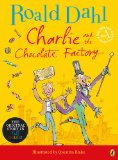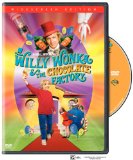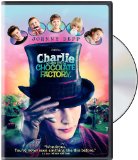| music/arts/books |
alivingdog.com |
 |
Read the Book, See the Movie:
Scott Sentinella Considers
Roald Dahl on Film |
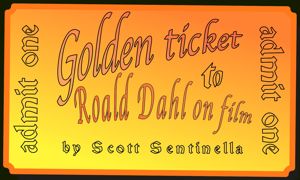 |
|
Roald Dahl is an author
of
children’s books whose distinctly British and darkly humored novels
have been turned into some delightfully twisted films. Dahl’s most
lasting achievement is probably the book Charlie and the Chocolate
Factory, which has been filmed twice, with both versions
remaining
popular. But this wasn’t always the case.
It
may surprise many to know that 1971’s Willy
Wonka and the Chocolate
Factory opened to a lukewarm response. The film may have struck
audiences as mean-spirited, but the movie gained a new following once
it hit television. The interesting thing is that Tim Burton’s remake, Charlie and the Chocolate Factory,
is superior to the 1971 version in
every way, except for the performance of the actor playing Wonka. The
first film had Gene Wilder, whose performance will live forever; the
second film has Johnny Depp, who is amusing, but one-dimensional.
|
|
With this kind of nuttiness
inherent in the material, Tim Burton was the perfect person to remake
the film. Yet there were howls of protest proclaiming how dare Burton
touch the 1971 classic; one wonders how many of those complaining
realized nobody cared much for the earlier film upon its original
release. The resulting 2005 Charlie
and the Chocolate Factory
displays more of Burton’s style than his Alice in Wonderland, but the
strange thing is that both the 1971 and 2005 productions really are
extremely faithful to the book. Burton’s film isn’t really a
“re-imagining”; it’s a straight-up remake, and a good one.
|
|
|
Dazzling Visuals
Burton’s reputation for
dazzling
visuals is on full display, and most of the cast, including Freddie
Highmore (Charlie) and David Kelly (Grandpa), out-perform their 1971
counterparts. The big difference this time around is that Johnny Depp
portrays Wonka, and he is deliciously creepy in a way that fits
Burton’s vision. Looking and sounding like Michael Jackson, Depp
doesn’t emulate Wilder in any way. This proves to be a wise move,
because although Depp is fun to watch, he appears to simply be fooling
around. Wilder was genuinely warm and fatherly, and then deeply scary;
Depp never appears to be similarly invested in the material. Let’s put
it this way: Wilder is playing a fully rounded character, whereas
Depp’s performance, while fun, feels like more of a stunt.The 2005 adaptation also
runs longer than the earlier version, due to the addition of an
extraneous subplot about Wonka’s estrangement from his father
(Christopher Lee). And, surprisingly—considering Burton’s penchant for
the macabre—the remake makes it clear that the other bratty kids did
survive their time in the chocolate factory; in the 1971 version, for
all you knew, they didn't. As with the revelations about Wonka’s
father,
Burton’s revisions seem unneccessary.
Both films remain
entertaining. The DVD for the 1971 movie features a 1971 featurette, a
sing-along, a trailer, a 2001 documentary, a commentary and a photo
gallery. The single-disc DVD for the 2005 film includes the trailer, a
featurette, and an interactive activity, “The Oompa-Loompa Dance”.
|
|
Lesser-known Dahl
Dahl’s book, James and the Giant
Peach remains lesser known than the adventures of Charlie
Bucket, but
it shouldn’t be this way. Filmed in 1996 by director Henry Selick, James tells another scary tale of a
British orphan named James (Paul
Terry) left in the care of his abusive aunts. This portion of the film
is in live-action, but once James finds himself traveling in a
fifty-foot-tall peach, inhabited by giant insects (voiced by
Simon Callow, David Thewlis, Richard Dreyfuss, Susan Sarandon, Jane
Leeves and Miriam Margoyles)—everything turns into stop-motion
animation. James is visually impressive, but
the story doesn’t hold together as
well as Charlie and the songs
are less memorable. Still, anyone who’s a
fan of Dahl, Selick or animation should try the DVD, which comes with a
few extras—a music video, a “making-of”, a stills gallery and a game.
|
 |
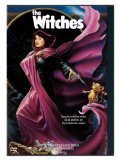 |
Nightmarish Imagery
Even more obscure than
“James” is
1990’s live-action The Witches,
starring Anjelica Huston and directed
by Nicholas Roeg. Dahl’s nightmarish imagery abounds as a young boy
(Jasen Fisher) stumbles upon a witches’ convention at a hotel. The
Grand High Witch (Anjelica Huston) plans to turn all children into
mice, and when she begins with our hero, it’s up to his grandmother
(Maj Zetterling) to fix things.The
Witches is fun for kids who aren’t easily freaked out, with
Huston’s
performance being a standout. The movie is available only on a
pan-and-scan, extras-free DVD, probably due to its box-office failure.
Unfortunately, none of the films based on Dahl’s books have been
financially successful (Tim Burton’s Chocolate
Factory remake aside).
Delightful
Animation
|
|
Wes Anderson’s wonderful film based
on Dahl’s Fantastic Mr. Fox
also failed to attract audiences. This
delightful stop-motion animated feature is as quirkily offbeat as
Anderson’s Rushmore, but with
its cast of talking animals it still
plays as fun family entertainment. Mr. Fox (voiced by George Clooney)
has promised his wife (Meryl Streep’s voice) that his poultry-stealing
days are over, but about twelve years into their marriage he resumes
his old ways. The result is that the local farmers are determined to
flush the Foxes and their animal friends out of their homes, but the
critters fight back. The marvelous thing about “Mr. Fox” is that it
still feels like a Wes Anderson film, from its use of onscreen chapter
titles to several unusual music choices on the soundtrack; how many
“kids’ movies” use the Rolling Stones’ “Street Fighting Man”? The DVD
is light on extras, with only three featurettes (total running time-15
minutes), and the trailer.
|
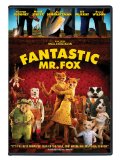 |
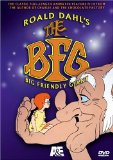 |
Fantastic
Mr. Fox deserves better
than it got at the box office, but who knows? The BFG (Big Friendly Giant) also got
animated treatment, this time by award-winning UK animators
Cosgrove-Hall, creators of the animated cult
classic, Danger Mouse. It's a
family favorite, suggested for kids three and up. If the once little
seen Willy Wonka can become a
classic, maybe the same thing will happen to
the films of Giant Peach,
Witches and Mr. Fox. Both Chocolate Factory films, Giant Peach, The Witches and Fantastic Mr. Fox are all worth
seeing (although Witches is
awfully
scary for kids under six), and, despite my reservations, you will
probably want to buy the original “Willy Wonka”, if only for Gene
Wilder. |
| more DVDs |
doghouse |
